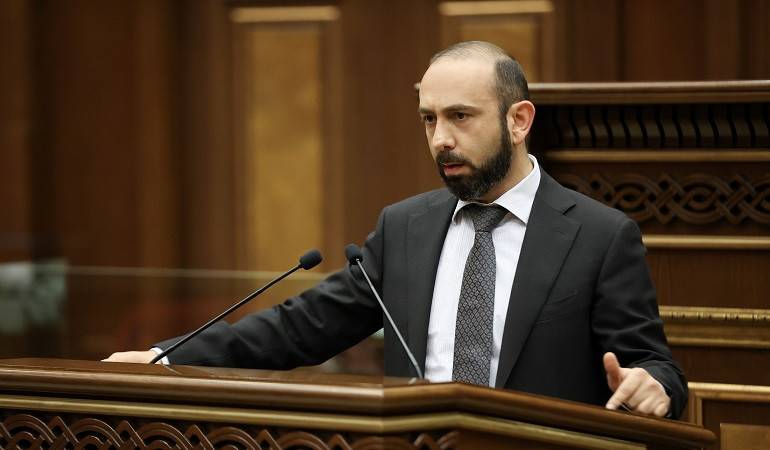The participation of the Minister of Foreign Affairs of Armenia in the Questions and Answers session with the Government at the National Assembly of Armenia
07 May, 2025On May 7, Minister of Foreign Affairs of Armenia Ararat Mirzoyan participated in the Q&A session with the Government at the National Assembly. Below are Minister Mirzoyan's responses to the question posed by the Member of Parliament.
Hasmik Hakobyan. Mr. Mirzoyan, since my question has already been raised, I would like to take this opportunity to hear your opinion regarding an accusation directed at us by the opposition. Specifically, the accusation is that the authorities are using the well-known document on the dissolution of Nagorno-Karabakh to cover up the fact of recognizing Nagorno-Karabakh as part of Azerbaijan in Prague in 2022. I would like to ask for your opinion on this matter.
Ararat Mirzoyan. Thank you, Ms. Hakobyan, for the question. In response, I am compelled to state something that, on the one hand, is a well-known fact, and on the other hand, certain officials have persistently avoided telling us it for quite some time, perhaps so as not to dampen our spirits. And that fact is the following: the Republic of Armenia has never recognized the Republic of Nagorno-Karabakh. I want to reiterate this simple yet very important point: the Republic of Armenia has never recognized the Republic of Nagorno-Karabakh. At the time, almost simultaneously with the dissolution of the USSR and the signing of the Alma-Ata Declaration, the Republic of Armenia recognized the territorial integrity of Azerbaijan within the borders that existed at the time of the USSR’s collapse. Moreover, the fundamental principle of mutually recognizing each other's territorial integrity has been explicitly expressed in all stages of the negotiation process of the Nagorno-Karabakh conflict, from the very beginning, and is reflected in all significant documents, including the Madrid Principles discussed today.
I would like to remind you that the first of the Madrid Principles is the principle of territorial integrity, while the other, the right to self-determination, was understood within the framework of territorial integrity.
For those who still have doubts about the connection between these two concepts or the context in which they are perceived, I would recommend to read the Chapter VIII of the Helsinki Final Act, titled “Equal Rights and Self-Determination of Peoples.” This chapter clearly states, and I will try to quote not merely verbatim but letter by letter, that the participating states undertake to recognize and respect the equal rights and the right of self-determination of peoples, acting at all times in accordance with the purposes and principles of the Charter of the United Nations and the norms of international law, including those relating to territorial integrity.
It is absolutely clear, explicit, straightforward - black on white.
This same fundamental principle of recognizing territorial integrity, in line with the Alma-Ata Declaration, is also reflected in later negotiation documents and in the statements resulting from meetings held in various formats, including the quadrilateral declaration of October 6, 2022, in Prague, which you referred to.
The same principle is also enshrined in the regulation on the joint work of the respective delimitation commissions of Azerbaijan and Armenia, which was signed on August 30, 2024, and entered into force following the relevant domestic procedures in both countries.
Looking ahead, I would also like to note that this very same principle, yes, is also reflected in the agreed text of the draft peace treaty between Armenia and Azerbaijan.
Response. Thank you, Mr. Mirzoyan. With the right of reply, I would like to ask one brief question as well. Since last night, active military activities have erupted between India and Pakistan. Do we have any comments on this?
Ararat Mirzoyan. Ms. Hakobyan, before addressing this question, I would like to begin by recalling what caused this escalation. A terrorist attack took place, and the Republic of Armenia responded promptly, by condemning the act of terrorism, expressing condolences to the families of the victims and showing solidarity with their relatives. I believe that no civilized country can ever condone or welcome terrorism, the latter can only be condemned. And I believe we must also recognize the country’s right to defend itself against terrorism. To be honest, this is the perspective through which we view this issue, this is how we perceive it, and this is our position. Thank you.


